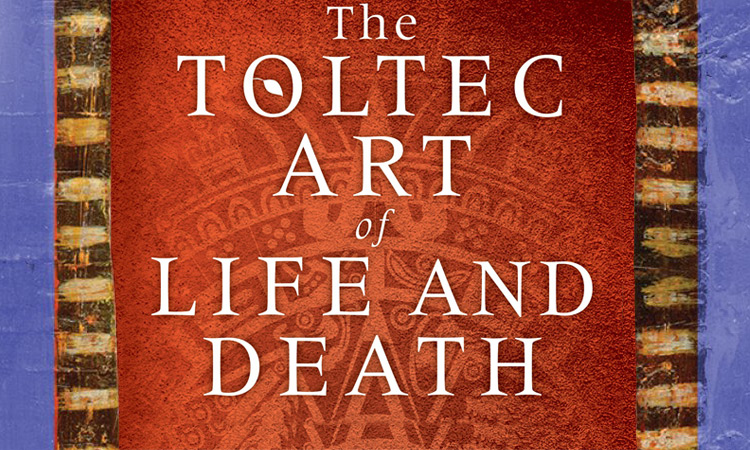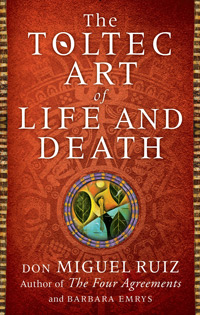 When I first read Don Miguel Ruiz’s The Four Agreements, I remember thinking how simple yet powerful his words were. We have all endured hardships and suffering, and he shows the essential steps to personal freedom: Be impeccable with your word. Don’t take anything personally. Don’t make assumptions. Always do your best.
When I first read Don Miguel Ruiz’s The Four Agreements, I remember thinking how simple yet powerful his words were. We have all endured hardships and suffering, and he shows the essential steps to personal freedom: Be impeccable with your word. Don’t take anything personally. Don’t make assumptions. Always do your best.
His latest book, The Toltec Art Of Life And Death, is a culmination of all the lessons he’s learned, shedding light on the universality of the human experience using ancient Toltec wisdom and his insights into the nature of life and death. This book was born out of Don Miguel Ruiz’s journey of spiritual enlightenment after suffering a near-fatal heart attack.
Here is an excerpt on awareness and transformation:
 As humans, we are familiar with war as an act of violence and aggression against other humans. Faction against faction, nation against nation, war is meant to resolve conflict; but, of course, it is the ultimate conflict. Killing incites more killing. Defeat provokes retaliation and vengeful uprising. War, as we know it, resolves little in the long run, but there is another kind of war that changes human behavior. If every man and woman had an appetite for this kind of war, where not a drop of blood is spilled and no humans die, aggression between nations would make no sense to us. It’s a different kind of mind that looks inward and perceives the need to fight a battle against its own long-held beliefs and judgments. It’s a rare mind that looks, sees, and then decides to wage this war—the last war.
As humans, we are familiar with war as an act of violence and aggression against other humans. Faction against faction, nation against nation, war is meant to resolve conflict; but, of course, it is the ultimate conflict. Killing incites more killing. Defeat provokes retaliation and vengeful uprising. War, as we know it, resolves little in the long run, but there is another kind of war that changes human behavior. If every man and woman had an appetite for this kind of war, where not a drop of blood is spilled and no humans die, aggression between nations would make no sense to us. It’s a different kind of mind that looks inward and perceives the need to fight a battle against its own long-held beliefs and judgments. It’s a rare mind that looks, sees, and then decides to wage this war—the last war.
A spiritual warrior is something unique. All battles rely on weaponry; and anyone can see how we defeat ourselves—and then others—with the weapons we call words. Words don’t need to be spoken to devastate. They have only to be thought. Words band together to form opinions, which strut along the back roads of our minds, inciting doubt and controversy. Opinions rally toward a cause—a belief. Beliefs that are shared by a community assume the status of truth. Without awareness, the war of ideas becomes a war against humans, but the war of ideas can be fought and won within each of us.
Ideas and innovative thinking are wonders of humanity; but when ideas battle against each other, perfect minds are put at risk. Imagine if every human had a disease that showed itself—a severe rash, for instance. If everyone walking on Earth had oozing, bleeding sores on their bodies, on every inch of skin, we could reasonably say that humanity was sick. The wounds that corrupt human thinking cannot be seen, but they are so real and so prolific that we can reasonably say humanity is sick. Childhood traumas and disappointments continue to cripple otherwise healthy adults. Guilt, shame, and tireless blaming turn people into victims. Constant judging makes people mean, and thoughts of injustice make them perpetually angry.
All political and cultural wars begin in one person’s mind—and that mind wants company. We want like-minded friends. Waves of aggression are most likely to arise from peaceful home fires, where a thought begins, then spreads to a conversation, and then becomes a rallying cry. One person’s psychological wounds spread to another, and then to many. The wounded mind, however, isn’t quite as wounded as it likes to think.
There is nothing either good or bad, but thinking makes it so. I don’t know if Shakespeare believed what he was writing, but he could have gone further. Nothing is actually good, bad, right, or wrong. We were told by parents and teachers to respond to life according to their ideas of right and wrong, and we are still bound by those rules. Without those boundaries, we are free to experience and to see. Without the intrusion of opinions, it’s possible to respond authentically. Whether something is good or bad, whether someone is right or wrong, is beside the point. This is. They are.
Everything is. Life is. You are. I am. We can choose to participate in someone’s dream or to turn away, but there is no compelling reason to judge. What am I? I once asked myself. I don’t know and I will never know. I have no opinions about myself, although clearly everyone around me does. People have opinions and judgments that have nothing to do with Miguel or his dream. Still, I exist in their imaginations. People assume they understand the motives that drive other minds, and the feelings that exist within other hearts. Their dreams are populated by imaginary friends and enemies, but there is only one character that can be understood and transformed—the main character of their own story. Every person is capable of seeing himself, hearing himself, and modifying what he sees—not because he sees imperfection, but because he sees infinite potential.
From THE TOLTEC ART OF LIFE AND DEATH. Copyright © 2015 by Miguel Ruiz and Barbara Emrys. Reprinted with permission by HarperOne, a division of HarperCollinsPublishers.

Rose Caiola
Inspired. Rewired.
Click here to find out more about Rose’s thoughts on wellbeing and health


2 Comments
Laura
This article is inspiring. Life is a dream and we’re all having our own dreams. Time to wake up to the dream reality.
Gianna Caiola
So glad you loved this article as much as we do!
Much Love,
RWM Staff